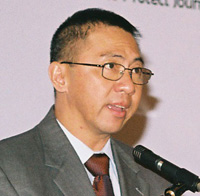Leo Dacera, a senior state prosecutor and head of the witness protection program for the Philippine Department of Justice, died suddenly on November 4. Initial news reports said Dacera, 54, left, was the victim of an apparent heart attack. Dacera’s untimely death is a tremendous blow to all those seeking to end the culture of impunity in Philippine journalist murders.
Dacera was a crucial, if unheralded, ally. He was directly responsible for winning convictions of three assailants in the murder of Marlene Garcia-Esperat, the crusading Philippine reporter slain in her home in front of her children in 2005. He was also a lead prosecutor in the ongoing case against defendants in the Magunidanao massacre, which took the lives of 32 journalists and media workers in November 2009.
“Leo was a great ally who understood what needed to be done,” said CPJ board member Sheila Coronel, a Philippine investigative journalist now teaching at Columbia University’s journalism school. “He will be sorely missed. I don’t think there’s anyone at the Department of Justice who comes close in terms of a commitment to seeing prosecutions through.”
I saw this firsthand when I met Dacera during a 2008 visit to the Philippines. Sheila and I met him in his office, where he spent several hours running through the list of outstanding cases on his docket. He talked about his efforts to ensure the safety of witnesses who had entered the protection program. Although the program was under-funded and unpopular in some political circles, Dacera was making steady progress.
I asked Dacera if I could mention this success to his boss at the time, Justice Secretary Raul Gonzales. Dacera told me no, that I shouldn’t even mention that we had met.
When I met Gonzales later, I could see why. He was overtly hostile. Gonzales received me while sitting on a beat-up couch in the middle of an open office. He glared with unmistakable contempt as I laid out CPJ’s research on the unpunished murders of dozens of journalists, then accused me of exaggerating the problem. He made clear he was not on our side in the anti-impunity struggle.
The brief meeting with the angry Gonzales made me admire Dacera all the more, because I saw precisely what he was up against.
While newspaper reports described Dacera’s cause of death as a heart attack, I was disconcerted by comments from current Secretary of Justice Leila de Lima. She said Dacera was under pressure, that he’d been threatened, and that he was depressed. While there is no evidence to suggest that he died from anything other than natural causes, given the sensitivity of his position a thorough and transparent investigation should be carried out.
Dacera sought justice, never the limelight. In death, however, his achievements must be recognized. He is one of the most committed and dedicated public servants I have met in all my time at CPJ. Although I did not know him well, I shall miss him tremendously.
